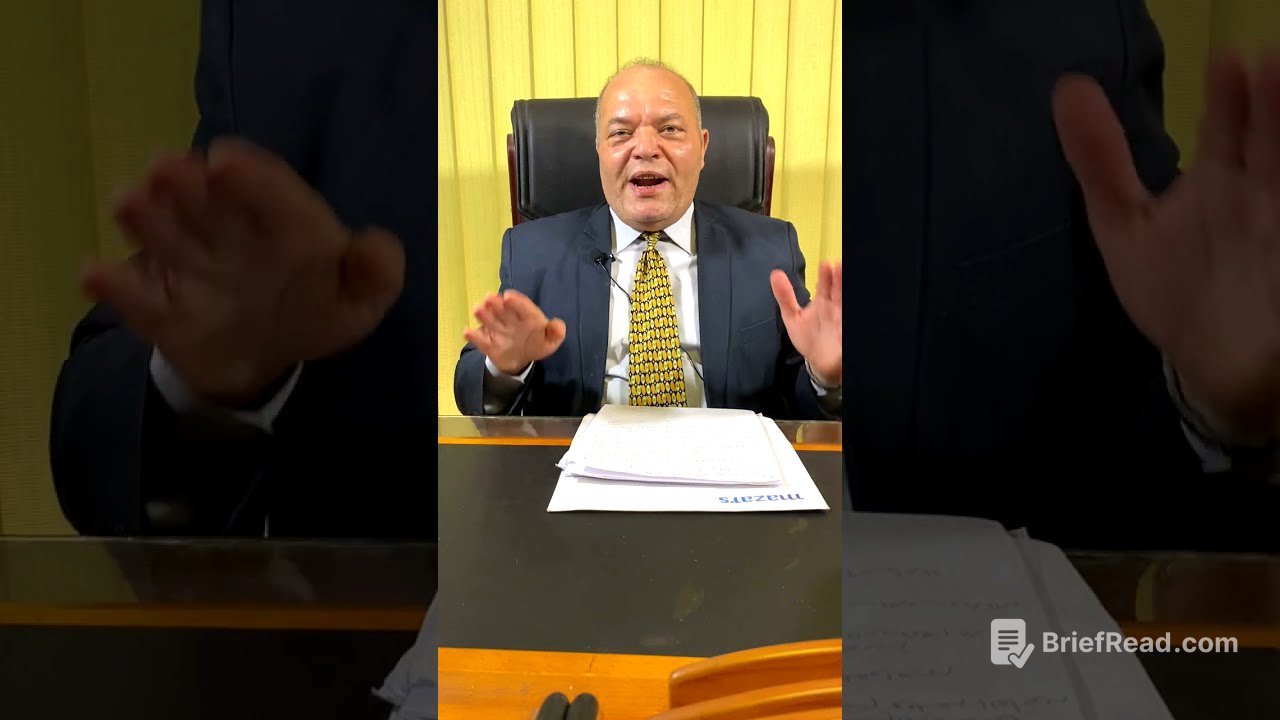TLDR;
This video discusses the old rental law in Egypt, questioning whether it is being revived and if Parliament and the government will respond to public concerns. It covers private housing rights, the economics of building for investment, and respect for Constitutional Court rulings. The video also addresses the liquidation of old rental laws, conditions for rent increases, and the potential crime of terminating a tenant's contract. It further examines the fate of advance payments, maintenance work done by tenants, and the social dimension of the old rental law, advocating for a balanced approach that respects both landlords and tenants while considering the demographic and social impacts of any new legislation.
- Private housing allows freedom in construction according to standards.
- Building for investment is subject to economic laws.
- Respect for Constitutional Court rulings is essential in new legislation.
- The social dimension of rental laws and potential demographic dangers must be considered.
Introduction: The Old Rental Law in Resuscitation? [0:01]
The video starts by introducing the topic of the old rental law in Egypt and questions whether it is truly being revived. It raises concerns about whether the Parliament and the government will address the issues and respond to the needs of the people affected by this law. The speaker aims to make this discussion significant by exploring various aspects of the rental law and its potential amendments.
Private Housing and Freedom of Property [0:40]
The discussion covers the concept of private housing, emphasizing the absolute freedom property owners should have over their land and buildings. The speaker argues that individuals who build private residences should not be restricted by laws that treat them as commercial entities. The constitution protects private property, allowing owners to freely manage and utilize their assets without undue interference.
Building for Economic Investment and Profit [4:23]
The video transitions to building for economic investment, discussing the history of rental contracts in Egypt, which dates back to 1920. The speaker explains that building for investment aims to generate profit, preserve capital, and maximize rental value. He notes that any new rental law should not be excessively biased towards lessors and should consider the economic realities and historical context of rental agreements.
Respecting Constitutional Court Rulings [9:31]
The importance of respecting the rulings issued by the Constitutional Court is emphasized. The Constitutional Court has organized the extension of rental contracts, aiming to balance the rights of landlords and tenants. The speaker insists that any new legislation must align with the Constitutional Court's rulings to ensure legitimacy and fairness. Parliament should not issue laws that contradict these established judicial decisions.
Liquidating the Old Rental Law [11:30]
The discussion addresses the liquidation of the old rental law, noting the declining number of apartments under this law, with approximately 1.6 million apartments remaining out of an initial 2.8 million. The speaker highlights the plight of pensioners, teachers, doctors, and workers who rely on these rental units. He shares a story of a retired school principal who faced significant rent increases, illustrating the challenges faced by tenants.
The Problem Will Solve Itself [14:19]
The speaker references the Supreme Constitutional Court’s ruling of 2002, suggesting that the problem of old rental laws will eventually resolve itself as people move on and conditions for extending contracts are not met. He points out that life's worries and circumstances often lead to natural resolutions of these rental situations.
The Tenant's Crime and Contract Termination [14:57]
The video raises a critical question: what crime has the tenant committed that justifies breaking their contract? The speaker argues that rental contracts were made by mutual consent, benefiting both parties. He expresses concern for pensioners, widows, and orphans who may be displaced if rental contracts are terminated. He appeals to the Parliament of Egypt to consider the human impact of these laws.
Fate of Retreats and Maintenance Work [17:04]
The discussion shifts to the fate of advance payments (retreats) and maintenance work done by tenants. The speaker questions the conditions for increasing rent and the standards used to determine these increases. He highlights the challenges of applying uniform standards to diverse housing situations, such as buildings without concrete walls or proper sewage systems. He also addresses the issue of tenants paying for renovations and maintenance, questioning whether they will be compensated for these investments.
Demanding Compensation for Maintenance [25:23]
The speaker urges tenants who have paid for maintenance and renovations to demand compensation for their expenses. He advises them to seek legal counsel and demand this money, especially if their rental agreements are terminated. He criticizes those who spread misinformation and emphasizes the importance of addressing the issue through legal means.
Philosophy of Law and Social Dimension [27:10]
The video concludes by discussing the philosophy of law and the social dimension of rental contracts. The speaker emphasizes that any new law must consider the social and security implications, including potential demographic shifts. He warns against the dangers of ignoring the social dimension, referencing historical examples where neglecting this aspect led to negative consequences. He advocates for laws that respect constitutional principles and allow landlords and tenants to reach mutually agreeable terms.









